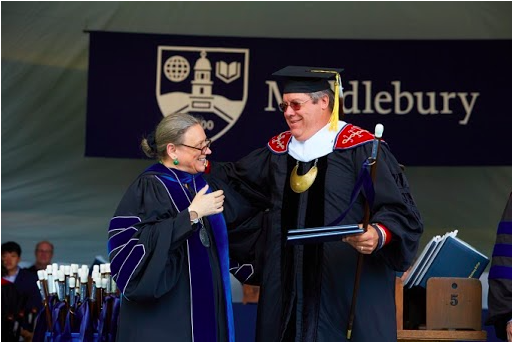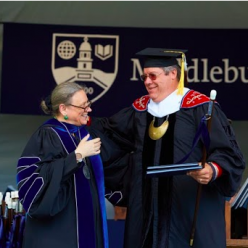by Annabelle Wyman ‘24.5
Middlebury College and the Abenaki community have a relationship that dates back to 1800 with the founding of the college on the traditional tribal lands of the Abenkai. This relationship has long been fraught with the history of settlers, as the college only recently began to make large advances in the process of reconciliation. This work is to make amends for the claiming of land from and lack of cooperation with the tribe. As part of this process, Middlebury crafted a land acknowledgement, included an Abenaki prayer at commencement ceremonies, and started an Abenaki Language School to teach the language; it is one of the most endangered in the world, and considered extinct by UNESCO (“Western Abenaki”). Additionally, the college presented two members of the Abenaki community with honorary degrees: Chief Don Stevens in 2019 and Jeanne Brink in 2018. This was a very symbolic move for the college as it helped to demonstrate a commitment to recognize and work with the Abenaki community.
At their inception, honorary degrees were given to people of high social status or wealth who held power and influence in society (Crockett). The degree was thus a way to flatter and bribe recipients for visibility and money rather than recognize them for their work (Dhondt 74). However, the number of honorary degrees which have been given to people because of their work, rather than their status, has been on the rise in recent years. Middlebury’s honorary degrees for Chief Don Stevens and Jeanne Brink are an example of this, as indigenous communities have historically been underrepresented in this recognition and undervalued in society. According to Jeffery Cason, the provost at Middlebury College, honorary degrees have transitioned to be a recognition of outstanding work in a field relating to a public service or public good. Honorary degrees hold their significance in the recognition themselves (Cason). The honorary degrees were a large step on Middlebury’s part towards reconciliation with the Abenaki community. Chief Don Stevens explained that, “the degrees also show a commitment and forward thinking direction that Middlebury College values the contributions and recognition of Indigenous and Abenaki people to the Vermont Landscape in which Middlebury occupies… Middlebury College has made that honor more than words and has created avenues of real change and partnership between us” (Stevens). The shift in recognition by the college to honor people for their work rather than their status in society, shows the change in meaning that honorary degrees are undergoing. Chief Don Stevens was given the degree for his leadership and his work to gain recognition of the Abenaki by the State of Vermont and Jeanne Brink for her work as an artist and activist in the community.

Chief Don Stevens receiving his honorary degree from President Laurie Patton in 2019
The honorary degrees are a step in the right direction for the college to take. However, it is important to note that honorary degrees are purely symbolic. They do not make up for the years of colonization, genocide, and stealing land that the colonists perpetrated towards the Abenaki. The work that Middlebury College is now doing to work with the Abenaki is wonderful, and will help both communities to become better. However, the college was founded by white people, for white people, and they need to continue working in tandem with the Abenaki community to help give them the benefits that the college has provided the non-indigenous community for so long. One of the withheld benefits has been honorary degrees; Chief Don Stevens and Jeanne Brink were the first two members of an Indigenous community to be recognized with an honorary degree by the college. Another benefit is the education and degree that the college gives to its undergraduates. Young members of the Abenaki community have not traditionally received degrees from the college, and this opportunity should be made more readily available by the school. Middlebury is not done with the work to reconcile with indigenous communities, simply by recognizing members of the Abenaki community. This work will never truly be done, and honorary degrees are only one way to slowly move forward towards it.
Further Reading
The Significance of Honorary Degrees in the Past and Present
Bibliography:
Cason, Jeffery. Interview by Annabelle Wyman, April 30th, 2021.
Crockett, Zachary. “Why Do Colleges Give Out ‘Honorary’ Degrees?” Priceonomics, http://priceonomics.com/why-do-colleges-give-out-honorary-degrees/. Accessed 20 Apr. 2021.
Dhondt, Pieter. “Honorary Doctoral Degrees as Expressions of Political and Cultural Relationships at Nordic University Jubilees (1840–1911).” Centaurus, vol. 56, no. 2, 2014, pp. 71–96. Wiley Online Library, doi:https://doi.org/10.1111/1600-0498.12051.
Stevens, Don. Interview by Annabelle Wyman, April 22nd, 2021.
“Western Abenaki Dictionary and Online Lessons: Home of the Abenaki Language.” WesternAbenaki.com, http://westernabenaki.com/. Accessed 20 May 2021.
